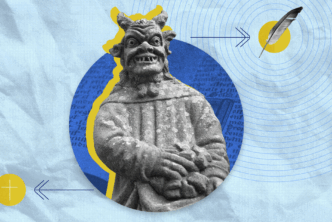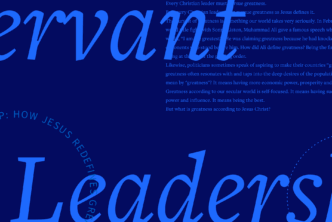Jesus Christ, the most profound teacher to ever walk the earth, selected the tiny mustard seed to use as an illustration in his teachings. He did so multiple times and to various effects. In all three of the Synoptic Gospels, Jesus utilized this inconspicuous object to convey sublime spiritual realities concerning his kingdom (Matt 13:31; cf. Mark 4:30–32, Luke 13:18-21) and the essence of true faith (Matt 17:14–20; cf. Luke 17:5–6). Taken together, these passages present at least three separate instances in which Jesus utilized the otherwise unremarkable mustard seed for a high-potency parable.
For the sake of convenience, we will primarily examine Matthew’s usage of the mustard seed as a didactic illustration in Jesus’s teaching ministry.
The mustard seed as the kingdom
In the first case (Matt 13:31–33), Jesus uses the mustard seed as a surprising analogy for the astounding growth potential of his kingdom. It is the kingdom itself that is likened to the mustard seed here, joining together a string of parables that together convey the unstoppable and undeniable reality of the kingdom, which is ever-expanding in the midst of the unbelieving world. This thematically unified series of parables, each with its own angles and nuances, together convey the sovereign ultimacy of Christ’s kingdom, even as its growth and vibrancy are markedly different from the powers of this world. Hindered as it is by stony ground, weeds, and even rival farmer-saboteurs, the kingdom’s supremacy will nevertheless advance unthwarted.
This parable is bound neatly to the following unit on the leaven (13:33), and both seem to convey something of the kingdom’s ultimate overtaking of the unbelieving world all around it. One cannot help but think here of the dream of Nebuchadnezzar in which a rock has broken off from the mountain and strikes and destroys the idols and images of this world’s pagan system (Dan 2:31–35). Indeed, the world will be saturated with truth as the gospel and the church will abound everywhere.
Though Jesus calls the mustard seed the smallest seed and cites the mature plant as among the largest in the garden, neither is literally or technically true. It is small, but not minuscule. This is a case of prophetic exaggeration. No parable should be contorted by such grossly literalistic analysis. Somewhat ironically, the leaven parable—a veritable twin to the mustard seed illustration—is one of the rare times in Scripture that leaven takes on a positive connotation as a symbol. The godly truth leavens the secular lump, bringing dynamic, living transformation to society.
The mustard seed as individual faith
In the second case (Matt 17:14–20), the mustard seed is used far more subjectively as an illustration of the individual believer’s faith. This time, the context is illustrative of an immediate need for such expanding kingdom confidence. The moment is dire. Here, a desperate father comes to Jesus pleading for help for his epileptic (?) son. The reader immediately sympathizes with his plight. The anguished father laments in pathetic groans that Christ’s disciples were entirely unable to help his son. Their healing ministry appears to have been more effective in other settings (Matt 10:5–16). In this crisis, they are impotent standbys. Mercifully, Jesus first grants the exorcistic healing; then he takes the disciples aside and chastises them for their “little faith” (see below). By doing so, he recontextualizes the mustard seed illustration to convey the incredible power of prayer, emboldened as it should be by the Holy Spirit in Jesus’s name.
Mustard seed as metaphor
There are at least three commonalities among the mustard seed texts:
- First, something little becomes something far greater than itself, if perhaps invisibly and subtly. The small band of disciples will blossom into a true, global church; an invincible force for grace that will eventually reach all nations. Likewise, prayer—when pleading with right motives and according to divine will—has the power to do immeasurably more than the simple words spoken by the believer would suggest.
- Second, the idea of life-bearing (or fruit-bearing) is implicit. After all, the mustard seed is an agricultural metaphor. Just as the kingdom is a living, growing entity, so also will the church flourish and expand until the entire world is enlivened with the glorious reality of the Son’s kingship. In the case of prayer, the life of God’s Spirit in the prayers of his people avail to great and even astonishing ends.
- Third, eventual but observable transformation seems implicit in the metaphor as well. What was once easy to ignore can no longer be overlooked. The seed observably and demonstrably grows. The dough undoubtedly expands. There will be both a reckoning and a recognition of its vibrancy all along.
Whether we are thinking of the kingdom itself or the very prayers that advance God’s reign, the idea is that the power of the word of God is as subtle and surprising as the tiniest seed, covered and hidden away by a thin layer of humus. Its work is as invisible as yeast but will be undeniably powerful after all.
“Oh you of little faith!”
There seems to be some connection between this “mustard seed” faith and another of the Lord’s favorite chastisements for his disciples, “Oh you of little faith!” (Matt 6:30, 8:26, 14:31, 16:8, 17:20). The Greek term is all one word here, oligopistoi. It could be rendered colloquially, if less sophisticatedly, as something like “tiny trusters” or “bitty believers.”
This seems to be something of a pet name that Jesus bequeathed to his disciples whenever they failed after having tried first unsuccessfully. Their trust is present, but not yet dynamic. They are alive, but not yet flourishing.
In Matthew’s Gospel, Jesus uses the term oligopistoi at least five different times. It is used in 6:30 in the Sermon on the Mount when his audience is doubting God’s provision of their daily needs. They believe but cannot quite trust him fully in pressing moments. We see it again in the boat in 8:26 when Jesus rebukes the wind and the waves. The disciples have followed him, but they do not yet fully recognize his sovereignty over nature. The term is used once more at 14:31 in a most remarkable moment when Peter has literally stepped onto the waves of the sea with Jesus, only to sink an instant later when he takes his eyes off Christ. But even Peter’s failure evokes wonder and further trust! And finally, we see it once more in 16:8, immediately following the Pharisees’ snide remarks and rebuke of Jesus’s ministry. They demand yet another even greater miracle-sign to authenticate his messiahship. But he will give them a resurrection instead. The disciples must not be corrupted by the Pharisees’s doubt.
Interestingly, Jesus does not use the term oligopistoi for unbelievers or skeptics, but for his believing disciples; those who have already given everything to follow him. They are weak but still growing. He does not use this term as an insult in order to discourage them, but merely to call them out of their cowardice and into a more courageous, trusting, hopeful, and Spirit-empowered walk. The term is a prod to encourage, not a whip to humiliate.
“I believe, help my unbelief!”
In Mark’s version of the story of the desperate father (9:14–29), neither the terminology of the mustard seed nor the gracious chastisement of oligopistoi is used. But obviously the themes discussed above are all present in this recounting of the miraculous healing story.
In Mark, like Matthew, the throng once again races to Jesus for help. This scene however is delightful in a way that the other editions of this healing are not. We are presented with a glorious glimpse into the dialogue that is not present in Matthew. In Mark’s account, the father’s absolute desperation is on full display in the form of an all-too-honest prayer of supplication: “I believe; help my unbelief!” This perhaps is the paradox of mustard-seed faith. In a loveably self-effacing confession, the father simultaneously admits his lack of trust and professes his real faith. He already believes, but needs divine help to fully trust the saving power of Christ.
Many readers can relate entirely to the father’s honest admission: God, we believe in you, but please make our faith stronger. (Compare the father’s faithful confession to Luke’s usage of the mustard seed illustration in 17:5–6.)
The mustard seed: little faith is true faith
Taken together, the parables and metaphors of the mustard seed are a call to deep and abiding faith. Part of the nature of our saving reliance in Jesus Christ is that we must remain confident in the promises of God to fully develop in his own sovereign time. Both prayer and even the kingdom itself “work” slowly and even imperceptibly. Jesus’s disciples are never promised such power “instantly” (cf. Matt 17:18). But the imperceptible power of faith in Christ does avail to “move mountains” (Matt 17:20).
Faith is as strong as the object of our belief, Jesus Christ. It does not depend on how “hard” we try. We may be oligopistoi, those of bitty faith, but Jesus is invincibly powerful. Our hope then is not relegated to our spiritual impotence but bound to the greater, mountain-moving power of Jesus Christ. In this way, we can come to Christ over and over again to make the same admission of the anguished father, “I do believe! Help my unbelief!” We are warmly invited to come to Christ over and over and say, “Increase our faith!” (Luke 17:5).






